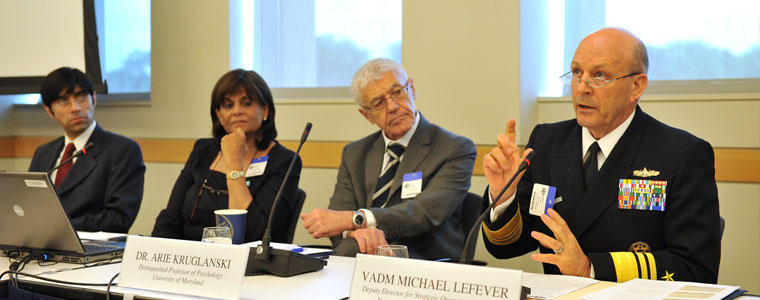Countering Radicalization and Violent Extremism in Pakistan
Extremist violence and growing radicalization continue to present a serious challenge to Pakistan’s stability. As efforts to counter violent extremism grow in prominence, the drivers of radicalization and extremism and the means to undercut these drivers remain inadequately understood. On May 9, USIP convened a panel of experts on radicalization for a discussion examining what drives radicalization, and how to address these drivers through strategies to counter violent extremism.
Read the event coverage, The Challenges of Countering Radicalization in Pakistan

In March 2012 alone, Pakistan experienced 113 reported terrorist/insurgent attacks, resulting in 136 deaths and 185 injuries. Underpinning this violence is the growing radicalization among Pakistani youth which, while not always manifesting itself violently, presents a somber potential future indicator.
As the narrative emergent from Pakistan continues to be dominated by this steady march of violence and growing radicalization, counterterrorism research increasingly points to the need for broader and longer-term approaches to stemming terrorism/insurgency. In the U.S. and elsewhere, experts are turning to countering violent extremism (CVE), conceptualized by some as the means to undercut the ideological and rhetorical narratives which drive violent extremism. Counter-radicalization and de-radicalization measures are receiving more focus as an aspect of a holistic approach aimed specifically at those who may have already drifted towards extremist ranks. Pakistan’s first major attempt at this in recent years is the Sabaoon project, which works to de-radicalize young men who were part of the Pakistani Taliban that captured the Swat Valley in 2007.
On May 9, USIP convened a panel examining the CVE challenge in the Pakistani context. The event featured clips from a forthcoming documentary on the Sabaoon project and a talk by the project’s director, Dr. Feriha Peracha, as part of a broader discussion on CVE approaches in Pakistan which included experts on the psychology of extremism as well as on U.S. efforts at CVE.
USIP’s on-the-ground work in Pakistan in part addresses how to counter violent extremism through media interventions, work with civil society organizations, and research on the drivers of and response options to extremism.
This event featured the following speakers:
- Dr. Arie Kruglanski, panelist
Distinguished Professor of Psychology
University of Maryland - Vice Admiral Michael LeFever, panelist
Deputy Director for Strategic Operational Planning
U.S. National Counter Terrorism Center - Dr. Feriha Peracha, panelist
Director and Supervising Psychologist
Sabaoon School, Pakistan - Moeed Yusuf, moderator
South Asia Adviser
United States Institute of Peace
Explore Further
- Listen to audio of this event
- Read the News Feature about this event, "The Challenge of Countering Radicalization in Pakistan"
- Learn more about USIP's work in Pakistan
- Read the Special Report, "Who Controls Pakistan's Security Forces?"
- Read the Peacebrief, "Pakistan, the United States and the End Game in Afghanistan: Perceptions of Pakistan's Foreign Policy Elite"
Related Academy Courses
- Supporting Police Reform: Capacity Building for Advisers and Trainers
- Negotiations from Checkpoints to High Politics
- Pilot: Cultural Adaptability: Advanced Applications



